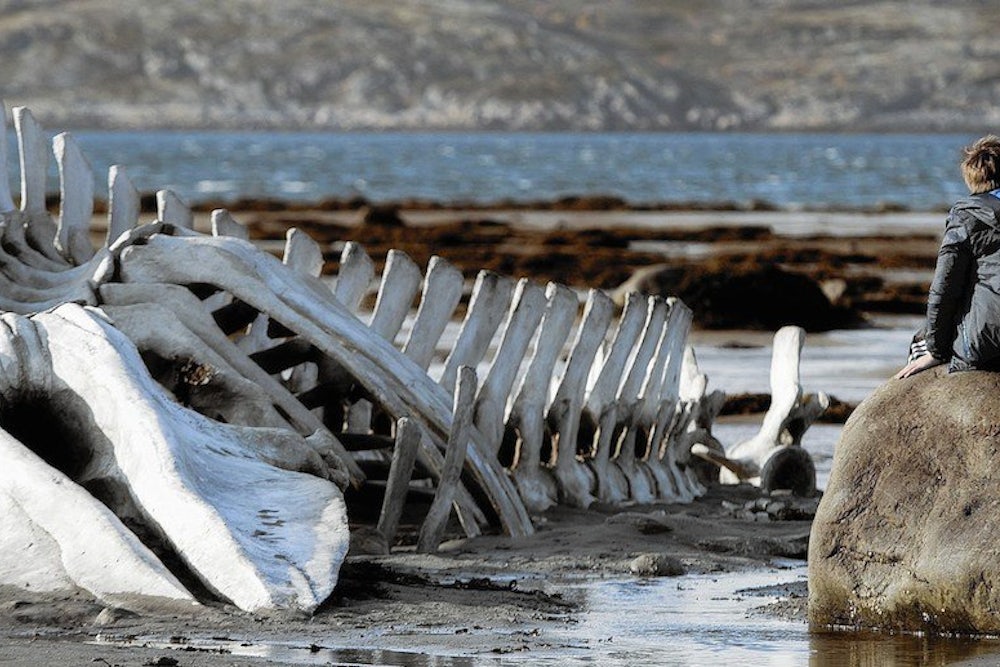Leviathan, the latest work by acclaimed Russian director Andrei Zvyagintsev (The Return, Elena), has been steadily gaining critical acclaim since its festival debut in Cannes last May. Already, it has some shiny credits to its name: It won the Golden Globe for Best Foreign Language Film and is a prime contender to win the same category at the Academy Awards come February 22.
Intense Russian-language dramas, though, tend to have a hard time of capturing the public eye, with or without a trophy on the mantle. In this case, that's a shame—and not just because Leviathan is a masterpiece, meticulously constructed and devastatingly beautiful. It's also an opportune chance for Western audiences to glimpse a vision of the Russian state from the viewpoint of those trapped inside it.
The film itself is a product of a collision of politics, culture, and speech. Back in April of 2013—before the Sochi Olympics, before the annexation of Crimea, before the collapse of the ruble—Putin declared that 2014 would be Russia's “Year of Culture,” prioritizing government initiatives that celebrated and encouraged Russia's historical-cultural tradition. This meant increased funding for museums, theaters, libraries, and individual artists, the construction of cultural centers in rural areas, and sponsorship for touring exhibitions and productions both within Russia and internationally. The publicly broadcast hope was that cultural cooperation between different countries and different areas of Russia would help promote tolerance between regions, ethnicities, and nations, but the subtext was quite different: a PR effort to quell foreign criticism by flaunting Russia's supposed commitment to freedom of expression.
Rather than soothe geopolitical tension, however, the “Year of Culture” turned into another battleground for it. A series of artistic events and exhibitions to be held as part of a joint program in the UK was boycotted by British ministers due to Russia's actions in Ukraine. Poland, meanwhile, cancelled a similar festival that was meant to take place in 2015. And then there's Leviathan, which found 35 percent of its production budget through Ministry of Culture funding.
The support was noteworthy, as Zvyagintsev's film makes no attempt to hide the director's contempt for the powers-that-be of Russian politics. Leviathan follows the trials of Kolya, a man living in an isolated village on the Arctic Sea, as he struggles to prevent his home from being seized by the town's corrupt, despotic mayor. In a particularly memorable scene, the mayor, a petty, oft-drunk weasel, threatens an idealistic Moscow lawyer—with a photograph of Putin hanging prominently over his shoulder. At another point, the camera significantly lingers on a TV news broadcast regarding Pussy Riot. And in the film's most darkly humorous sequence, Kolya and his friends use photographs of former Russian leaders (Lenin, Brezhnev, Gorbachev) for target practice, dismissively refusing to shoot at any contemporary politicians because “they aren't ripe yet”—as if Putin is too lowly to even merit proper ire. This is a film with discontent in its marrow.
The Russian government's reaction to Leviathan was predictable. Russia's Minister of Culture, Vladimir Medinsky, notably snubbed the film by refusing to attend its premiere in Cannes, declaring “it's talented, but I did not like it.” Ostensibly, he disapproved of the film's liberal use of obscenities, and the film's Russian release was delayed from November 2014 to February 2015 in order to edit out the profanity. But Medinsky was also quoted elsewhere saying “Let all the flowers grow, but we will only water the ones we like.” Only a few weeks before the film's scheduled Russian debut, the culture ministry passed extremely troubling new exhibition requirements, allowing the ministry to deny exhibition licenses to films that “threaten national unity” or “denigrate its culture.” The timing for such blatantly ideological censorship seems hardly a coincidence, though there is no word yet whether the new measure will further affect the release of Leviathan.
These ominous admonitions didn't stop Russia's Oscar selection committee (composed of veteran filmmakers, not government officials) from submitting Leviathan to the Best Foreign Language Film category. And that is to the benefit of the American audiences who can and should now see the film. Not only is it a pointed critique of Putin, it's a more nuanced look at the systemic, entrenched dynamics that have enabled decades of authoritarian rule.
The toll of Soviet history is apparent in the bleak fatalism of Leviathan. In the godforsaken landscape of the Arctic Circle, it's not just politicians that Kolya can't trust. The church, the law, family, friends: Every social institution meant to support Kolya is somehow poisoned against him. Despair starts to rule the day as his legal troubles are compounded by a crumbling marriage, a trumped-up murder charge, and a significant dose of vodka. Even in casual conversations, Zvyagintsev isolates his characters in the frame, pitting them alone against unseen forces. As it was in the days when every neighbor and acquaintance was a possible informer, the threat is formless and therefore ubiquitous: As one character declares, demoralized, “everyone is to blame for everything.” Many critics have noted the film's reflections of the Book of Job, but Leviathan does not even offer the measured optimism of reward through faith.
For Putin's regime, 2014 was perhaps the “Year of Culture,” but for the average Russian, it was just another year of repression and turmoil. In a way, it doesn't matter if Russians love or hate Putin, want to re-elect him or replace him: distrust and discomfort with their government, and themselves, runs much deeper.
But hope remains in the creation and distribution of works like Leviathan. Putin and Medinsky would like to use Russian cultural expression as just another tool in their arsenal, but Zvyagintsev has snuck past them to bring a shattering, necessary perspective into the limelight. An Oscar seems a just reward.
For more Oscar coverage, click here.
